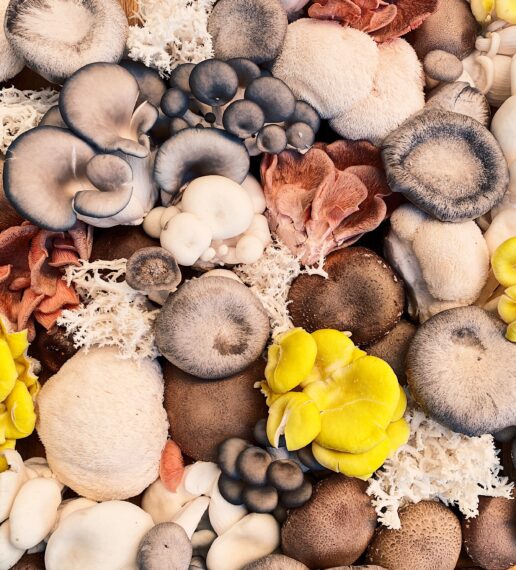How To Make Your Own Homemade Vegan Protein Powder
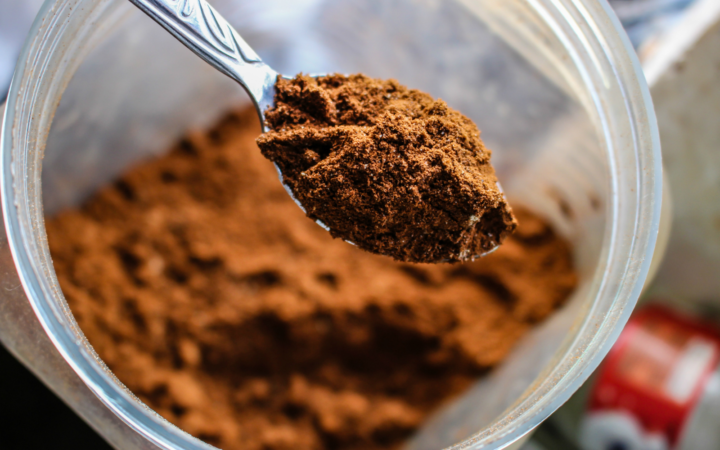
Contents
When it comes to following a vegan diet, there’s one question that gets asked more than any other: “How do you get enough protein?”
It’s a valid concern, but there’s really no need to worry.
While it’s true that few nutrients are as important as protein, a well-balanced vegan diet centered on whole foods can provide all the nutrients required for good health. And it does so without the cancer risks associated with eating red meat.
An easy way to help boost your protein content is with vegan protein powders. Although it’s super convenient to buy the pre-made versions, it can also be satisfying to make your own.
Plus, making your own protein powder ensures that you know exactly what’s in it. That means no weird, hard to spell, or potentially harmful ingredients.
Sound complicated?
Not at all. In fact, you can make your own homemade vegan protein powder and you don’t need to be a culinary master to make it happen.
All you need is a blender or food processor, an air-tight container, and a few ingredients to mix and match.
Most of the ingredients listed below are gluten-free and offer a solid amount of protein, so have fun creating your own personal combinations with flavors and textures you enjoy.
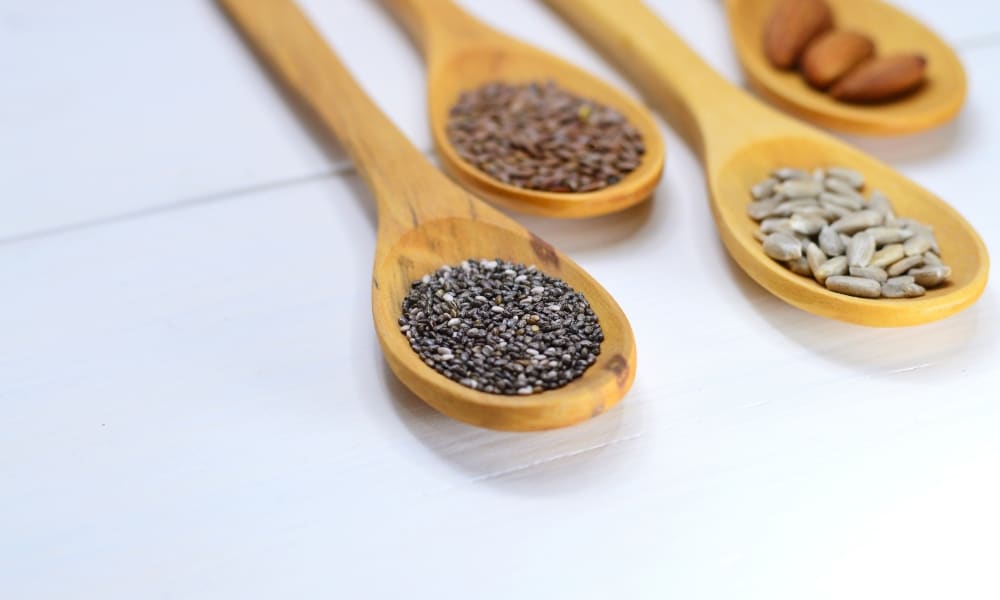
High-Protein Seeds For Vegan Protein Powder
Making DIY protein powder is easier than you think. Below are some ideas of what to keep stocked in your pantry so you can make your own protein powder whenever the mood strikes you.
For these ingredients, use about 1/4 cup—two ounces or 38 grams—of whichever one you prefer. You could also choose a couple different seeds and play around with measurements until you find the perfect combination that suits your tastes and needs.
Hemp Seeds
One of the few vegan food sources of complete protein (a.k.a. the nine essential amino acids that come from the foods you eat), hemp seeds contain 10 grams of complete protein for every ounce (28 grams), which is almost twice as much as chia seeds and flaxseeds.
Along with high protein content, hemp seeds have omega-3 and omega-6 fatty acids, magnesium, iron, calcium, zinc, and selenium. If you don’t have hemp seeds on hand, you can also use hemp hearts, which have a slightly nuttier flavor, or a high-quality hemp protein powder.
Chia Seeds
Native to Central America, chia seeds have become a versatile protein source for vegans and non-vegans alike. A little over one ounce (35 grams) has six grams of protein and 13 grams of fiber.
These tiny seeds are also rich in iron, calcium, magnesium, omega-3 fatty acids, and antioxidants. Although pretty tasteless by themselves, chia seeds are all about texture.
Because they quickly absorb water, they increase in volume to create a thick, gel-like consistency that works well in vegan recipes for smoothies, sauces, and puddings.
Sunflower Seeds
These nutty-tasting seeds from the beautiful sunflower are small but mighty. One ounce (28 grams) of raw sunflower seeds has six grams of protein and 37% of the recommended daily intake of vitamin E, which is proven to have a powerful dual effect as an antioxidant and anti-inflammatory.
Sunflower seeds are also a good source of selenium, manganese, and copper. Just remember to use raw, unsalted sunflower seeds in your DIY protein powder otherwise you could end up with high salt levels.
Pumpkin Seeds
Also known as pepitas, pumpkin seeds are not only a tasty protein source, but they’re also a solid source of healthy fats and antioxidants that are essential for a healthy heart.
One ounce (28 grams) of raw pumpkin seeds has about six grams of protein and 261 milligrams of potassium. Pumpkin seeds are also one of the best natural sources of magnesium, which is necessary to regulate muscle and nerve function, blood sugar, and blood pressure. Grind up these bad boys and you’ll have your own pumpkin seed protein powder in no time.
Flax Seeds
Sometimes called linseed, flax seeds are a vegan’s best friend when it comes to omega-3 fats. These fatty acids found in fish provide alpha-linolenic acid, one of the two essential fatty acids that your body can’t produce but needs for heart health.
Flax seeds are also a good source of high-quality protein—one ounce of flax seeds (28 grams) has a little over five grams of protein as well as many nutrients including fiber, vitamin B, and lignans, which may reduce breast cancer risk. Flax seeds can be purchased already ground up, or you can grind them yourself before adding to your protein powder mixture.
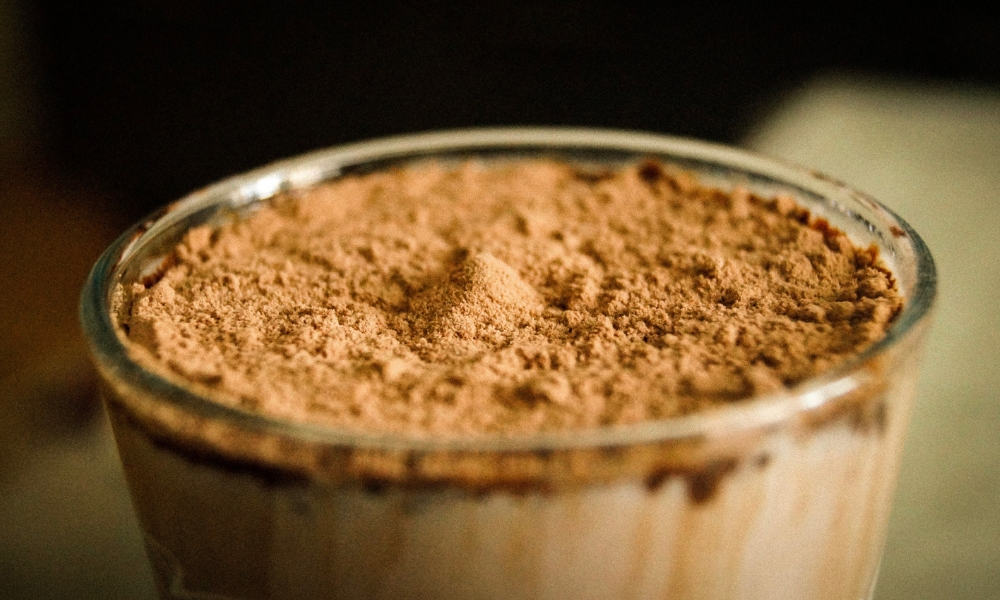
Powdered Nutrients For Vegan Protein Powder
Although the whole idea of creating your own homemade protein powder is to avoid store-bought powders in the first place, these dried protein sources are great supplements to the seeds and other ingredients you’ll be using. Choose one and feel free to use up to 1/4 cup serving size.
Spirulina
This edible algae is quite literally out of this world when it comes to nutrients—NASA is currently testing how to grow it in space as a food source for astronauts! Dried spirulina has more than 16 grams of complete protein per ounce (almost 40% of the daily recommended amount), 85% of the recommended daily value of copper, and 44% of iron and vitamin B1 (thiamin). This powdered seaweed also has a good amount of manganese, riboflavin, and potassium as well as some essential fatty acids. Phycocyanin, the bluish pigment that gives spirulina its color, is also known for its antioxidant and anti-inflammatory effects.
Pea Protein
Made from finely ground peas, pea protein powder packs a punch with 21 grams of protein for every 1/4 cup (28 grams). It’s also rich in essential amino acids and iron. What’s more, pea protein powder is naturally gluten-free and dairy-free and doesn’t contain any of the other major food allergens, i.e. eggs, soy, peanut, tree nuts, fish, and shellfish.
Maca Root
Made from the maca plant that grows in central Peru, maca powder is loaded with antioxidants and is often used as a way to increase energy and endurance. One ounce (28 grams) of maca root powder has 16 grams of protein and 133% of the recommended daily intake of vitamin C.
It also has a solid amount of iron and copper. While some don’t mind its earthy flavor, for many it’s definitely an acquired taste, so use a small amount to start.
Raw Cacao
Not to be confused with its sweeter cousin cocoa powder, unsweetened raw cacao powder is minimally processed and has a much stronger flavor that can come off as bitter. One ounce (28 grams) of raw cacao powder has almost six grams of protein and a good amount of magnesium and iron.
Cacao is also rich in minerals and has tryptophan, that famed amino acid also found in turkey that helps your body make feel-good serotonin.
Boosters For Vegan Protein Powder
Add these additional ingredients to your protein mix to amp up the protein content and load up on texture and flavor. Use anywhere from two tablespoons up to 1/4 cup for your protein powder.
Mushroom Extract
Mushrooms might not be the first thing that come to mind when creating a vegan protein powder, but these superfoods should not be ignored.
Although the mushrooms you saute in a pan or add as a pizza topping have plenty of health benefits, powdered extracts of certain mushrooms (also called functional mushrooms) are packed with even more medicinal benefits and are a strong source of copper, selenium and B vitamins.
Varieties such as lion’s mane, reishi, chaga, turkey tail, and maitake are also rich in beta D-glucans, which act as powerful support for your immune system, among other benefits.
Oats
More than just a hot breakfast cereal, oats are a healthy whole grain that’s clinically proven to be good for your heart and for lowering cholesterol.
Half a cup (40 grams or 120 ml) of dry whole oats offers more than six grams of protein and four grams of fiber. Oats also contain decent amounts of magnesium, zinc, phosphorus and the B-vitamin folate.
Nuts
Nuts are great protein sources with one ounce (28 grams) containing anywhere between five to seven grams of protein, depending on the nut. Peanuts take the lead, followed by almonds, Brazil nuts, cashews, hazelnuts, pine nuts, pistachios, and walnuts.
Nuts are not only a rich source of healthy fats, fiber, and antioxidants, but they add great texture to protein powders. Of course, if you want to be nut-free you can simply swap these for another ingredient.
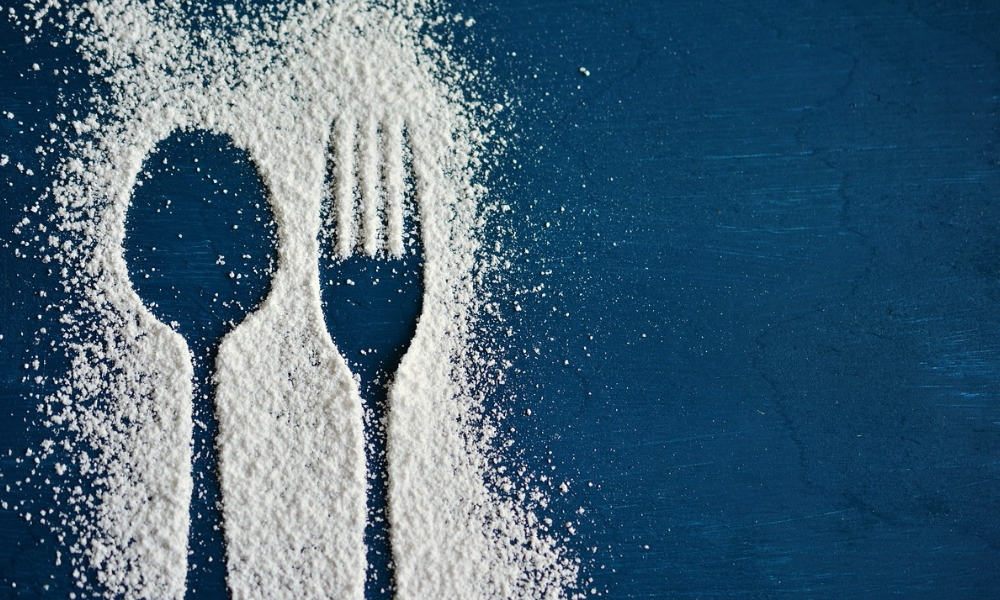
Adding Non-Sugar Sweeteners
While all of these ingredients are excellent choices, the bottom line is that if it doesn’t taste good, you’re not going to eat it. To sweeten up things beyond peanut butter, consider these natural sweeteners.
- Coconut Sugar
- Maple Powder
- Ground Stevia Leaf
- Powdered fruit
- Monk fruit
DIY For The Win
With so many different combinations to make your own homemade protein powder recipes, there’s no reason not to give it a try. Doing it yourself is empowering because you gain greater control over what you’re putting in your body.
So go ahead and add these blends to your next post-workout protein shake or favorite smoothie recipe and get ready to enjoy more plant-based proteins in your diet.
